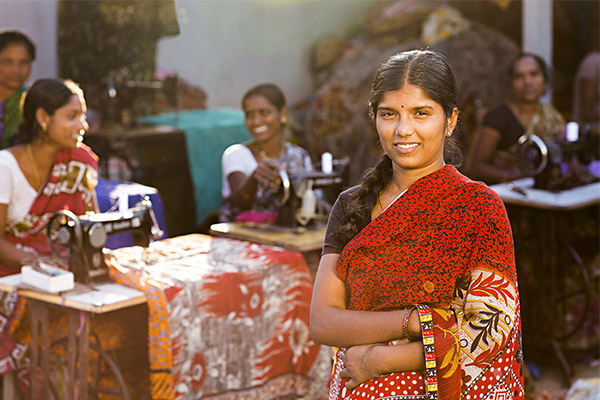Entrepreneurship in India is full of innovative ideas and creative business solutions to several problems. However, the startup and MSME sectors are largely male-dominated.
According to Startup India data, below 14 percent of Indian entrepreneurs are women. There are just over eight million female entrepreneurs in the country, while the number of male entrepreneurs is well over 50 million.
There is now a need for sustainable growth of women entrepreneurs to promote balanced growth in the country. Through several funding schemes for boosting women entrepreneurship, the central and state governments and banks across the country have been addressing the disparity.
Ahead of International Women’s Day, here are some of the funding schemes for women entrepreneurs:
Mudra Yojana Scheme
Mudra Yojana Scheme — a government scheme for small units — is also applicable to women who want to start a small enterprise, such as a beauty parlour, tuition centre, tailoring unit, etc. Women entrepreneurs can avail of loans from Rs 50,000 onwards and up to Rs 50 lakh under the scheme. They are required to present collateral and guarantors only if the loan amount exceeds Rs 10 lakh.
There are three plans under this — Shishu plan (loans up to Rs 50,000 for new businesses), Kishor plan (loans between Rs 50,000 and Rs 5 lakh for well-established enterprises), and Tarun plan (loans between Rs 5 lakh and Rs 10 lakh for business expansion).
MUDRA does not lend directly to individuals, and loans under the scheme can be availed from banks and NBFCs. Borrowers can also file an online application for MUDRA loans on the Udyamimitra portal. TREAD (Trade-Related Entrepreneurship Assistance and Development) scheme.
The TREAD scheme is aimed at women who don’t have easy access to bank credit. The scheme provides for business projects, conducting training and counselling sessions. It also helps with a government grant of up to 30 percent of the total project cost as appraised by lending institutions. These institutions would finance the other 70 percent. The grant is limited to Rs 5 lakh per project.
The loan and grant amounts are routed through NGOs, which are also responsible for imparting the training sessions. The cost of training (up to Rs 1 lakh) will be borne by the government if the NGOs bring their share of the government grant to a minimum of 25 percent.
Mahila Udyam Nidhi Scheme
Offered under the Small Industries Development Bank of India (SIDBI), Mahila Udyam Nidhi Scheme provides financial assistance of up to Rs 10 lakh to women entrepreneurs to set up new small-scale ventures. It also assists with upgrading and modernisation of existing projects. The loans are to be repaid within 10 years, which includes a five year moratorium period.
Interest rates on these loans can vary according to market rates and from bank-to-bank.
Annapurna Scheme
Annapurna Scheme applies to women entrepreneurs who have started a food catering unit or wish to start one. Under this scheme, they can avail of a loan of up to Rs 50,000 to purchase kitchen essentials, utensils, gas connections, raw materials, water filters, etc.
A guarantor is required to secure the loan. After securing the loan, it can be repaid in 36 instalments (the repayment period is three years). Further, interest rates under this scheme are decided as per prevailing market rates.
Stree Shakti Package For Women Entrepreneurs
It is offered to women who have majority ownership (over 50 percent) in a small business. These women also need to be enrolled in the Entrepreneurship Development Programmes (EDP) organised by their respective state agency.
Loans under the scheme require no security and are given at an interest rate of 11.2 percent onwards. The repayment tenure is a maximum of 36 months, including one month moratorium period. Under the scheme, an interest concession of 0.05 percent can be availed on loans above Rs 2 lakh.
Bhartiya Mahila Business Bank (BMB) Loan
This loan scheme is categorised under four types — BMB Shringaar for beauty parlour/salons and spas; BMB Annapurna Loan for food catering; BMB SME Easy for SMEs; and BMB Parvarish for daycare centres.
This scheme — which comes under the Credit Guarantee Fund Trust for Micro and Small Enterprises (CGTMSE) — involves loans of up to Rs 20 crore for women business owners. In fact, there is no need for collateral for loans up to Rs 1 crore.
The loans under this scheme are to be repaid in seven years. The scheme was implemented by Bhartiya Mahila Bank, which merged with the State Bank of India in 2017.
Dena Shakti Scheme
The Dena Shakti Scheme provides loans up to Rs 20 lakh for women entrepreneurs in agriculture, manufacturing, micro-credit, retail stores, or similar small enterprises. Under the scheme, loans up to Rs 50,000 are offered under the micro-credit category.
The rate of interest is charged as per extant guidelines of Dena Bank, which facilitates loans, and RBI directives. A concession or rebate of 25 basis points in the rate of interest as applicable to existing activities is provided to women beneficiaries, subject to conditions specified by the Dena Bank.
Udyogini Scheme
This scheme provides subsidised loans to aspiring women entrepreneurs from rural and under-developed regions. It extends interest-free loans of up to Rs 3 lakh to women entrepreneurs running or starting small-scale industries.
The government proposes up to 30 percent subsidy on loans extended under this scheme. Women entrepreneurs between the ages of 25 and 65 with a family annual income of less than Rs 1.5 lakh can apply. The upper limit for income is not applicable for women under special categories, including disabled, widowed, and destitute.
Cent Kalyani Scheme
Offered by the Central Bank of India, this scheme is for women business owners in multiple areas across manufacturing and services, including handlooms, food processing, garment making, etc. The purpose of the scheme is to provide loans to meet capital expenditure on plant and machinery, equipment, daily expenses, and others.
Under this scheme, loans up to Rs 1 crore are sanctioned with a 20 percent margin on collateral. Moreover, the interest rates on loans depends on varying market rates.








